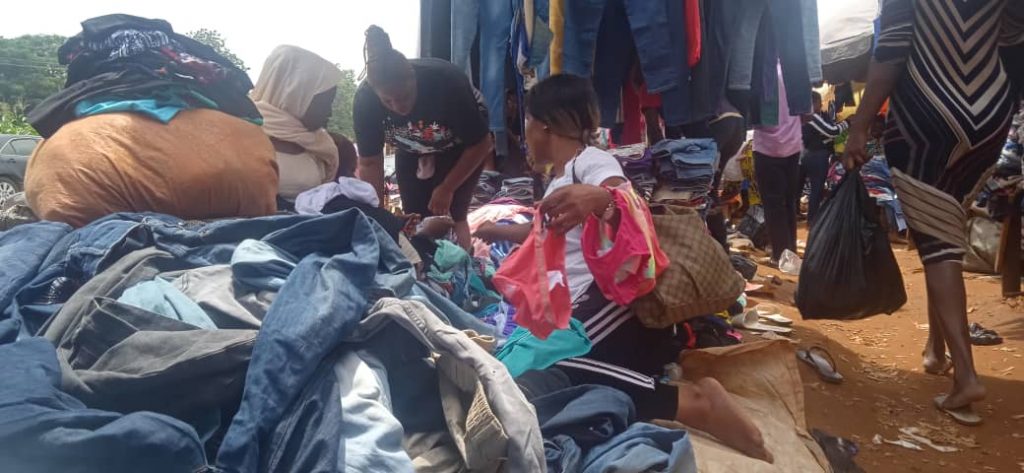
By Idris Ibrahim
Traders of second-hand clothes popularly known as “Okrika, bend-down select” in Abuja have disclosed that women are their foremost customers across the country’s capital city, Newsdiaryonline investigation reveals.
Despite health risks, large chunk of Nigerians between the lower and middle class income earners still patronise second-hand clothes including under wears, shoes and bags.
Newsdiaryonline investigation revealed that most of the buyers of second-hand clothes preferred patronising the products due to their ‘durability, affordability and uniqueness’.
However, traders of “Okrika” clothes in Abuja disclosed to Newsdiaryonline reporter that women and children items are the most patronised products in markets across the city’s metropolitan area.

Further findings by this newspaper revealed that the country’s capital city plays host to major second-hand clothing markets that operate on designated days.
It was gathered that the major “Okrika” markets in the Federal Capital Territory (FCT) are; Nyanya, Kabusa, Karmo, Dei-Dei and Gosa respectively.
•Why We Prefer Selling Women, Children Second-hand Clothes
Traders of second-hand clothing in Abuja groaned over the recent hike in the price of the fairly used foreign products. Traders who buy the products in bales lamented that they are facing low patronage due to the high cost of supply.
Blessing Udeh, a trader of second-hand clothes in Kabusa, a suburb of Abuja told Newsdiaryonline reporter that women and children clothes moves faster in their own market.
“Women patronise our products more. Men clothes doesn’t move fast. Once you open a bale generally that contains women clothes, it moves faster. Women like to change; a woman will come here today and buy stuff, next market she will still revisit your shop and buy things.”

“Men clothes do not move fast. Men generally can wear a cloth for a long period of time. So, the fastest business in terms of Okrika (Oke) is women stuffs. They (women) buy both shoes bags, tops and underwear,” she said.
Miss Udeh further revealed to this newspaper that ladies from 15 years upward are their main customers in Kabusa second-hand clothing markets that operate every Saturday of the week.
“Women from 15 years upward often patronise our business. Another market that moves fast is children clothes, because, mothers always like to see their children look good. Children clothes are more expensive,” she said with excitement.
Chidi Ike, a distributor of variety of female underwear in Karmo market told this newspaper during a visit to the market Saturday that he’s satisfied with the number of female customers that often frequent his shop.
“This market that operates only Tuesday and Friday, considering the hike in prices of second-hand clothes, I still get a reasonable number of female traders and buyers that patronise me,” he said.
“Our Importers are in Lagos, we are just distributors. When they (importers) import, I will go there and get it and distribute to other traders.
•Traders Groan Over Hike in Dollars
Daniel Okwuza, trader who deals in both male and female jean trousers in Karmo second-hand clothing market, told Newsdiaryonline how the recent hike in dollars affected their business.
” The dollars is too high(sic), it really affected our market so badly we cannot even sell much quantity of clothes again,” he lamented.
Mr Okwuza looking distraught appealed to the federal government to swiftly address the hike in dollars as it affects traders that deals in imported commodity.
The current exchange rate of one dollar to naira is over N560, they noted.
“If there is anyway the government can help us to bring down the price of dollars or work on the economy so that the exchange rate of dollars can come down.”
“By doing so, buyers can patronise more. Increment in dollars really affected our business so badly,” he lamented.
The distraught trader further revealed to this newspaper that a bale of jean trousers that he used to purchase at the price between N27,000 to N30,000 now goes for N80,000 to N100,000.
Mrs Christiana Atah, a distributor of children second-hand wears in Karmo market, said her customers often patronise her but they are complaining bitterly about the hike in price of fairly used clothes.
The old matriarch who has been in the business for decades said that it is second-hand clothing business that sustained her and her entire family of 8 over the years.
“Now that dollar is high , the goods are too costly and our customers who buy from us and resell are complaining. A bale of children’s material that goes for less than N150,000 now sells for over N250,000. When the price of dollars is low, it also reflects in the prices of the goods,” Mrs Atah said.
•Why We Prefer Buying Second-hand clothes
Residents in Abuja said “Okrika” clothes are more durable than the new manufactured clothes and imported ones from China.
However, they further revealed that the aforementioned clothes are inferior to second-hand clothes.
Blessing Olatayo, a resident of Abuja, told Newsdiaryonline reporter at Kabusa market that she prefers foreign fairly used clothes because they give her the quality she wants.
“As for me, I love second-hand clothes much better than all these new clothes because I get the desired quality I want. And, me in particular, I don’t like wearing clothes that are rampant and in this Okrika stuffs you are talking about, you get quality clothes that are unique and not rampant in the market.”(sic).
“Before you see that same cloth, it is very rare. So, you can’t see it anyhow on people’s body like that,” she said.
Madaki Danlami, a resident living in Wumba community told our reporter in Hausa that he prefers buying second-hand clothes because of the quality and durability.
The low-income earner and father of seven, said the economic hardship in the country has made them to embrace fairly used clothes.
“The money I make in a month can barely feed me and my entire family. (But) dressing is a necessity because we cannot go out naked. I usually buy second hand clothes for myself, wife and children because they last longer, he said.
•Health Challenges Wearing Second-hand Clothes
A skin doctor specialist only identified as Dr. Clement told Newsdiaryonline by phone that people who wear second-hand clothes can easily be exposed to different ailment.

“Such practices could expose such individuals to some health challenges.”
“Most importantly dermatological ailments like fungi or tinea infections and some other contagious parasites like lice and scabies,” the dermatologist said.
•Why Fairly Used Clothes Compete with New Substandard Clothes
Liborous Oshoma, a public affairs analyst told Newsdiaryonline reporter in a telephone interview that the cost of bringing in fairly used clothes is higher than that of brand new sub-standard clothes from China and Turkey.
The Lagos based lawyer said the people that are dealing in fairly used clothes are not as rich as those dealing in the new ones.
“What you have is that you have new sub-standard having to compete with fairly used standard.”
“The people that are dealing in fairly used are usually not as rich as as those dealing in the new ones, so, the force, power to accept foreign currency at the black market is not there.”
“So, and with the high cost of the dollar it becomes difficult for them to now buy and sell in the Nigerian markets where the purchasing power is static,” he said.
Mr Oshama revealed that the turn over of importers of fairly used clothes in Nigeria is usually very low compared to those that are dealing in brand new substandard clothes.


